Comprehensive Report on Health and Socio-Political Issues in Aged Care
VerifiedAdded on 2023/04/08
|11
|2245
|425
Report
AI Summary
This report provides an overview of the health and socio-political issues affecting aged care, particularly within the Australian context. It highlights the increasing need for primary healthcare services for the aging population, considering factors such as multiple illnesses, disabilities, and socio-economic challenges. The report discusses health promotion and prevention strategies, the structure of Australia's health systems for older people, and the importance of disease-specific care plans. It also addresses elder abuse and outlines key governmental laws like the Aged Care Act 1997 and related agencies. An evaluation of the services provided, including transportation, clinic facilities, and medication management, is presented alongside a critical discussion of the National Aged Care Advocacy Program (NACAP) and its associated networks. The report concludes by emphasizing the need for continued efforts to improve the health, lifestyle, and access to care for older individuals through supportive policies and frameworks.
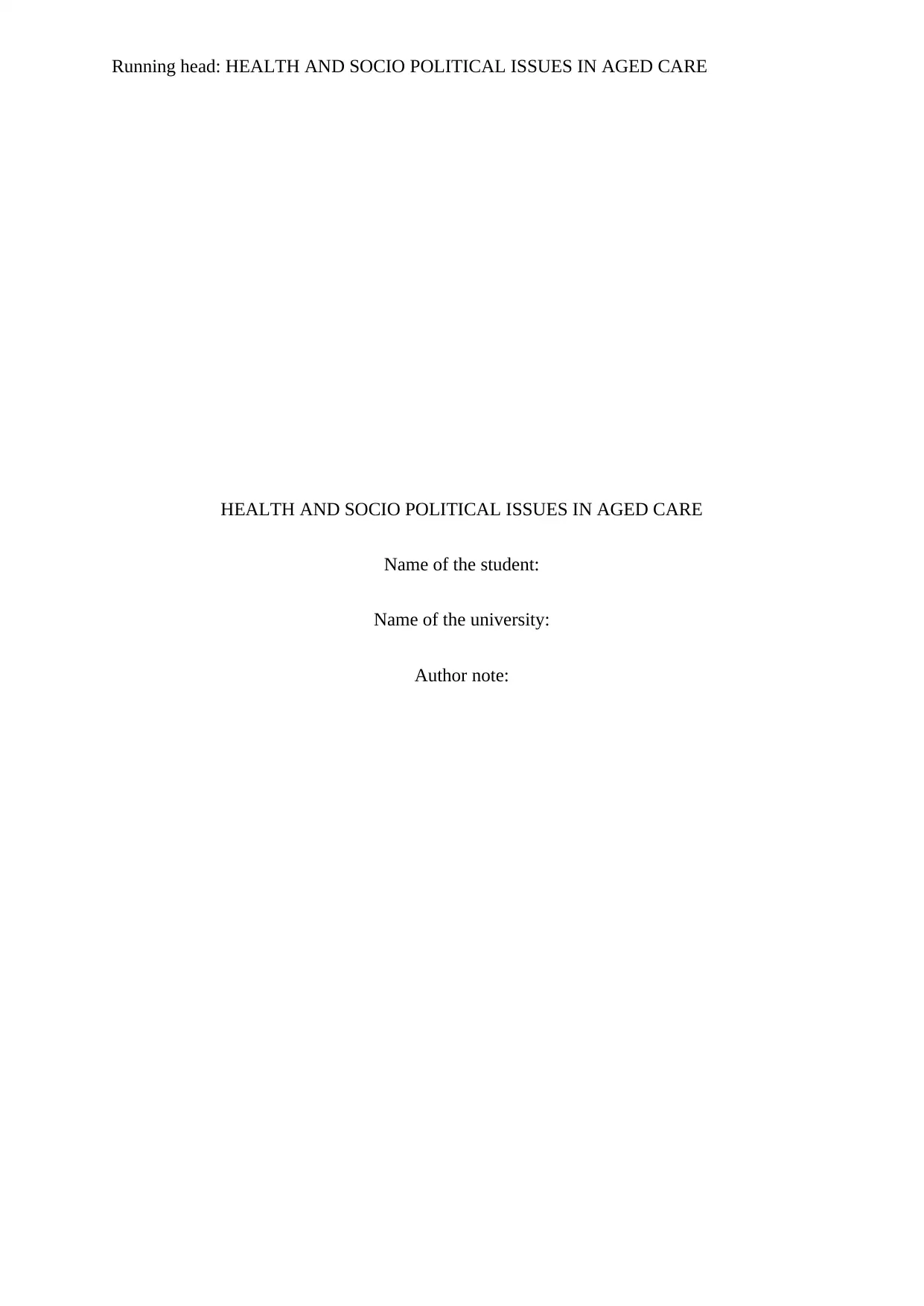
Running head: HEALTH AND SOCIO POLITICAL ISSUES IN AGED CARE
HEALTH AND SOCIO POLITICAL ISSUES IN AGED CARE
Name of the student:
Name of the university:
Author note:
HEALTH AND SOCIO POLITICAL ISSUES IN AGED CARE
Name of the student:
Name of the university:
Author note:
Paraphrase This Document
Need a fresh take? Get an instant paraphrase of this document with our AI Paraphraser
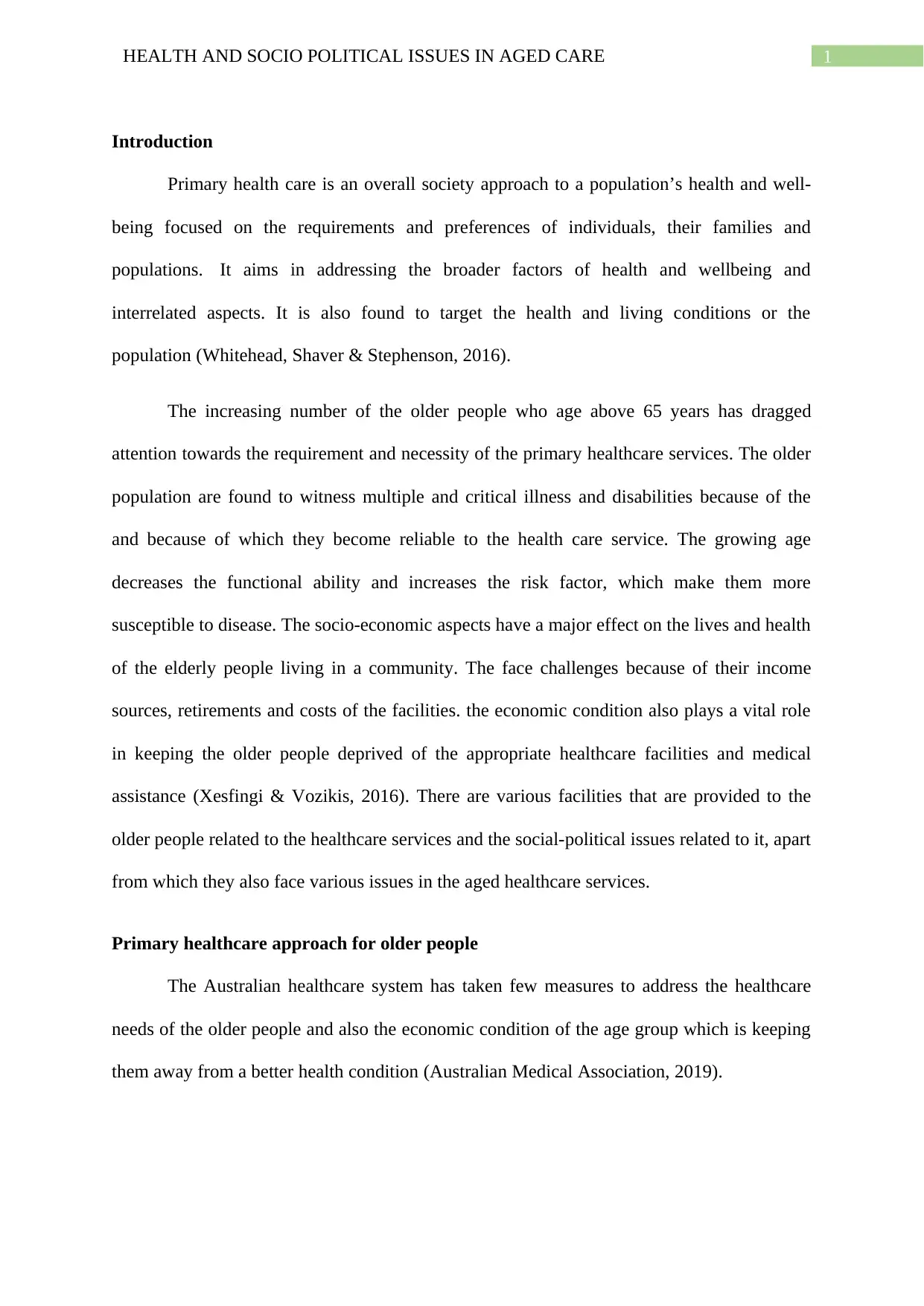
1HEALTH AND SOCIO POLITICAL ISSUES IN AGED CARE
Introduction
Primary health care is an overall society approach to a population’s health and well-
being focused on the requirements and preferences of individuals, their families and
populations. It aims in addressing the broader factors of health and wellbeing and
interrelated aspects. It is also found to target the health and living conditions or the
population (Whitehead, Shaver & Stephenson, 2016).
The increasing number of the older people who age above 65 years has dragged
attention towards the requirement and necessity of the primary healthcare services. The older
population are found to witness multiple and critical illness and disabilities because of the
and because of which they become reliable to the health care service. The growing age
decreases the functional ability and increases the risk factor, which make them more
susceptible to disease. The socio-economic aspects have a major effect on the lives and health
of the elderly people living in a community. The face challenges because of their income
sources, retirements and costs of the facilities. the economic condition also plays a vital role
in keeping the older people deprived of the appropriate healthcare facilities and medical
assistance (Xesfingi & Vozikis, 2016). There are various facilities that are provided to the
older people related to the healthcare services and the social-political issues related to it, apart
from which they also face various issues in the aged healthcare services.
Primary healthcare approach for older people
The Australian healthcare system has taken few measures to address the healthcare
needs of the older people and also the economic condition of the age group which is keeping
them away from a better health condition (Australian Medical Association, 2019).
Introduction
Primary health care is an overall society approach to a population’s health and well-
being focused on the requirements and preferences of individuals, their families and
populations. It aims in addressing the broader factors of health and wellbeing and
interrelated aspects. It is also found to target the health and living conditions or the
population (Whitehead, Shaver & Stephenson, 2016).
The increasing number of the older people who age above 65 years has dragged
attention towards the requirement and necessity of the primary healthcare services. The older
population are found to witness multiple and critical illness and disabilities because of the
and because of which they become reliable to the health care service. The growing age
decreases the functional ability and increases the risk factor, which make them more
susceptible to disease. The socio-economic aspects have a major effect on the lives and health
of the elderly people living in a community. The face challenges because of their income
sources, retirements and costs of the facilities. the economic condition also plays a vital role
in keeping the older people deprived of the appropriate healthcare facilities and medical
assistance (Xesfingi & Vozikis, 2016). There are various facilities that are provided to the
older people related to the healthcare services and the social-political issues related to it, apart
from which they also face various issues in the aged healthcare services.
Primary healthcare approach for older people
The Australian healthcare system has taken few measures to address the healthcare
needs of the older people and also the economic condition of the age group which is keeping
them away from a better health condition (Australian Medical Association, 2019).
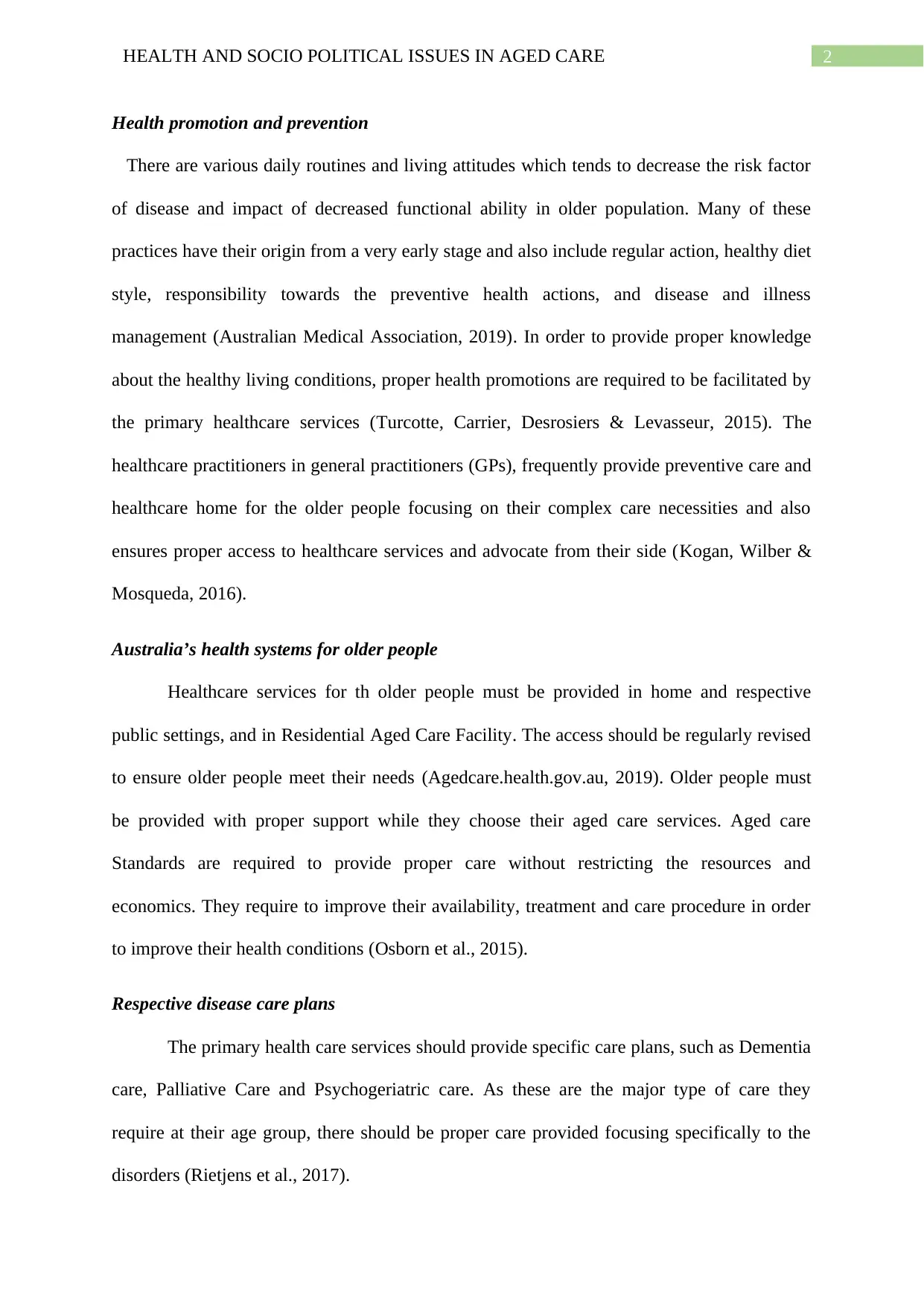
2HEALTH AND SOCIO POLITICAL ISSUES IN AGED CARE
Health promotion and prevention
There are various daily routines and living attitudes which tends to decrease the risk factor
of disease and impact of decreased functional ability in older population. Many of these
practices have their origin from a very early stage and also include regular action, healthy diet
style, responsibility towards the preventive health actions, and disease and illness
management (Australian Medical Association, 2019). In order to provide proper knowledge
about the healthy living conditions, proper health promotions are required to be facilitated by
the primary healthcare services (Turcotte, Carrier, Desrosiers & Levasseur, 2015). The
healthcare practitioners in general practitioners (GPs), frequently provide preventive care and
healthcare home for the older people focusing on their complex care necessities and also
ensures proper access to healthcare services and advocate from their side (Kogan, Wilber &
Mosqueda, 2016).
Australia’s health systems for older people
Healthcare services for th older people must be provided in home and respective
public settings, and in Residential Aged Care Facility. The access should be regularly revised
to ensure older people meet their needs (Agedcare.health.gov.au, 2019). Older people must
be provided with proper support while they choose their aged care services. Aged care
Standards are required to provide proper care without restricting the resources and
economics. They require to improve their availability, treatment and care procedure in order
to improve their health conditions (Osborn et al., 2015).
Respective disease care plans
The primary health care services should provide specific care plans, such as Dementia
care, Palliative Care and Psychogeriatric care. As these are the major type of care they
require at their age group, there should be proper care provided focusing specifically to the
disorders (Rietjens et al., 2017).
Health promotion and prevention
There are various daily routines and living attitudes which tends to decrease the risk factor
of disease and impact of decreased functional ability in older population. Many of these
practices have their origin from a very early stage and also include regular action, healthy diet
style, responsibility towards the preventive health actions, and disease and illness
management (Australian Medical Association, 2019). In order to provide proper knowledge
about the healthy living conditions, proper health promotions are required to be facilitated by
the primary healthcare services (Turcotte, Carrier, Desrosiers & Levasseur, 2015). The
healthcare practitioners in general practitioners (GPs), frequently provide preventive care and
healthcare home for the older people focusing on their complex care necessities and also
ensures proper access to healthcare services and advocate from their side (Kogan, Wilber &
Mosqueda, 2016).
Australia’s health systems for older people
Healthcare services for th older people must be provided in home and respective
public settings, and in Residential Aged Care Facility. The access should be regularly revised
to ensure older people meet their needs (Agedcare.health.gov.au, 2019). Older people must
be provided with proper support while they choose their aged care services. Aged care
Standards are required to provide proper care without restricting the resources and
economics. They require to improve their availability, treatment and care procedure in order
to improve their health conditions (Osborn et al., 2015).
Respective disease care plans
The primary health care services should provide specific care plans, such as Dementia
care, Palliative Care and Psychogeriatric care. As these are the major type of care they
require at their age group, there should be proper care provided focusing specifically to the
disorders (Rietjens et al., 2017).
⊘ This is a preview!⊘
Do you want full access?
Subscribe today to unlock all pages.

Trusted by 1+ million students worldwide
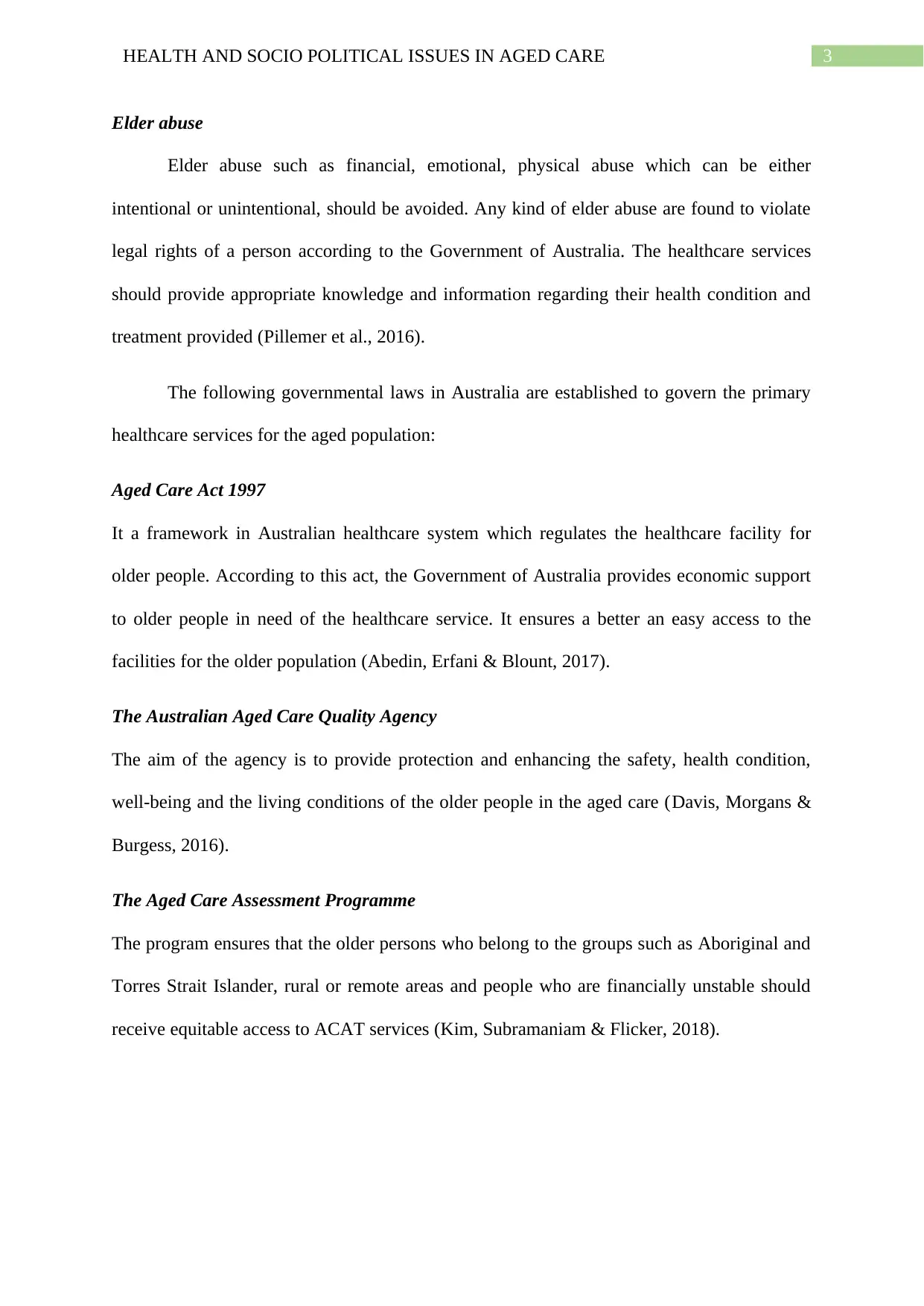
3HEALTH AND SOCIO POLITICAL ISSUES IN AGED CARE
Elder abuse
Elder abuse such as financial, emotional, physical abuse which can be either
intentional or unintentional, should be avoided. Any kind of elder abuse are found to violate
legal rights of a person according to the Government of Australia. The healthcare services
should provide appropriate knowledge and information regarding their health condition and
treatment provided (Pillemer et al., 2016).
The following governmental laws in Australia are established to govern the primary
healthcare services for the aged population:
Aged Care Act 1997
It a framework in Australian healthcare system which regulates the healthcare facility for
older people. According to this act, the Government of Australia provides economic support
to older people in need of the healthcare service. It ensures a better an easy access to the
facilities for the older population (Abedin, Erfani & Blount, 2017).
The Australian Aged Care Quality Agency
The aim of the agency is to provide protection and enhancing the safety, health condition,
well-being and the living conditions of the older people in the aged care (Davis, Morgans &
Burgess, 2016).
The Aged Care Assessment Programme
The program ensures that the older persons who belong to the groups such as Aboriginal and
Torres Strait Islander, rural or remote areas and people who are financially unstable should
receive equitable access to ACAT services (Kim, Subramaniam & Flicker, 2018).
Elder abuse
Elder abuse such as financial, emotional, physical abuse which can be either
intentional or unintentional, should be avoided. Any kind of elder abuse are found to violate
legal rights of a person according to the Government of Australia. The healthcare services
should provide appropriate knowledge and information regarding their health condition and
treatment provided (Pillemer et al., 2016).
The following governmental laws in Australia are established to govern the primary
healthcare services for the aged population:
Aged Care Act 1997
It a framework in Australian healthcare system which regulates the healthcare facility for
older people. According to this act, the Government of Australia provides economic support
to older people in need of the healthcare service. It ensures a better an easy access to the
facilities for the older population (Abedin, Erfani & Blount, 2017).
The Australian Aged Care Quality Agency
The aim of the agency is to provide protection and enhancing the safety, health condition,
well-being and the living conditions of the older people in the aged care (Davis, Morgans &
Burgess, 2016).
The Aged Care Assessment Programme
The program ensures that the older persons who belong to the groups such as Aboriginal and
Torres Strait Islander, rural or remote areas and people who are financially unstable should
receive equitable access to ACAT services (Kim, Subramaniam & Flicker, 2018).
Paraphrase This Document
Need a fresh take? Get an instant paraphrase of this document with our AI Paraphraser
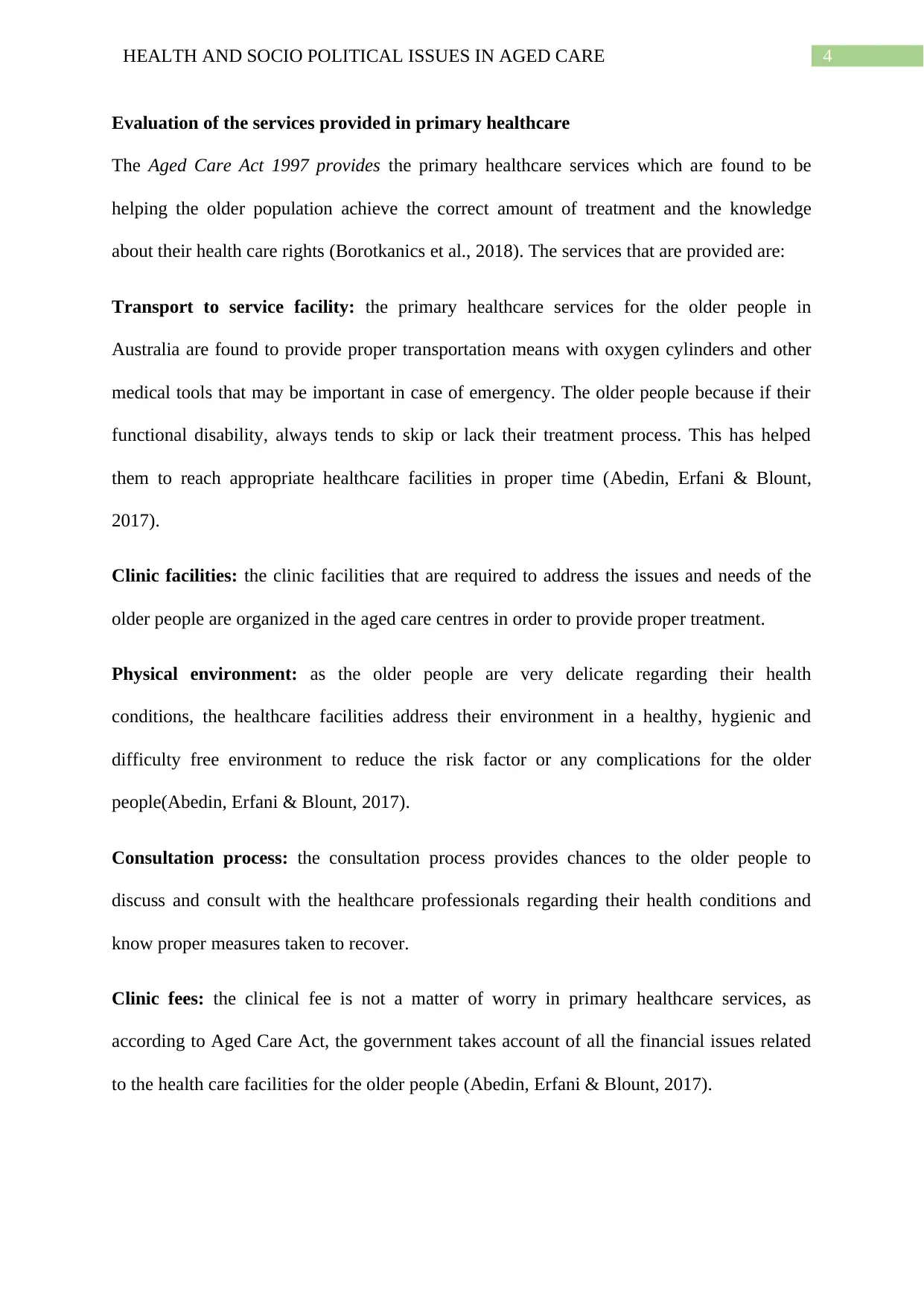
4HEALTH AND SOCIO POLITICAL ISSUES IN AGED CARE
Evaluation of the services provided in primary healthcare
The Aged Care Act 1997 provides the primary healthcare services which are found to be
helping the older population achieve the correct amount of treatment and the knowledge
about their health care rights (Borotkanics et al., 2018). The services that are provided are:
Transport to service facility: the primary healthcare services for the older people in
Australia are found to provide proper transportation means with oxygen cylinders and other
medical tools that may be important in case of emergency. The older people because if their
functional disability, always tends to skip or lack their treatment process. This has helped
them to reach appropriate healthcare facilities in proper time (Abedin, Erfani & Blount,
2017).
Clinic facilities: the clinic facilities that are required to address the issues and needs of the
older people are organized in the aged care centres in order to provide proper treatment.
Physical environment: as the older people are very delicate regarding their health
conditions, the healthcare facilities address their environment in a healthy, hygienic and
difficulty free environment to reduce the risk factor or any complications for the older
people(Abedin, Erfani & Blount, 2017).
Consultation process: the consultation process provides chances to the older people to
discuss and consult with the healthcare professionals regarding their health conditions and
know proper measures taken to recover.
Clinic fees: the clinical fee is not a matter of worry in primary healthcare services, as
according to Aged Care Act, the government takes account of all the financial issues related
to the health care facilities for the older people (Abedin, Erfani & Blount, 2017).
Evaluation of the services provided in primary healthcare
The Aged Care Act 1997 provides the primary healthcare services which are found to be
helping the older population achieve the correct amount of treatment and the knowledge
about their health care rights (Borotkanics et al., 2018). The services that are provided are:
Transport to service facility: the primary healthcare services for the older people in
Australia are found to provide proper transportation means with oxygen cylinders and other
medical tools that may be important in case of emergency. The older people because if their
functional disability, always tends to skip or lack their treatment process. This has helped
them to reach appropriate healthcare facilities in proper time (Abedin, Erfani & Blount,
2017).
Clinic facilities: the clinic facilities that are required to address the issues and needs of the
older people are organized in the aged care centres in order to provide proper treatment.
Physical environment: as the older people are very delicate regarding their health
conditions, the healthcare facilities address their environment in a healthy, hygienic and
difficulty free environment to reduce the risk factor or any complications for the older
people(Abedin, Erfani & Blount, 2017).
Consultation process: the consultation process provides chances to the older people to
discuss and consult with the healthcare professionals regarding their health conditions and
know proper measures taken to recover.
Clinic fees: the clinical fee is not a matter of worry in primary healthcare services, as
according to Aged Care Act, the government takes account of all the financial issues related
to the health care facilities for the older people (Abedin, Erfani & Blount, 2017).
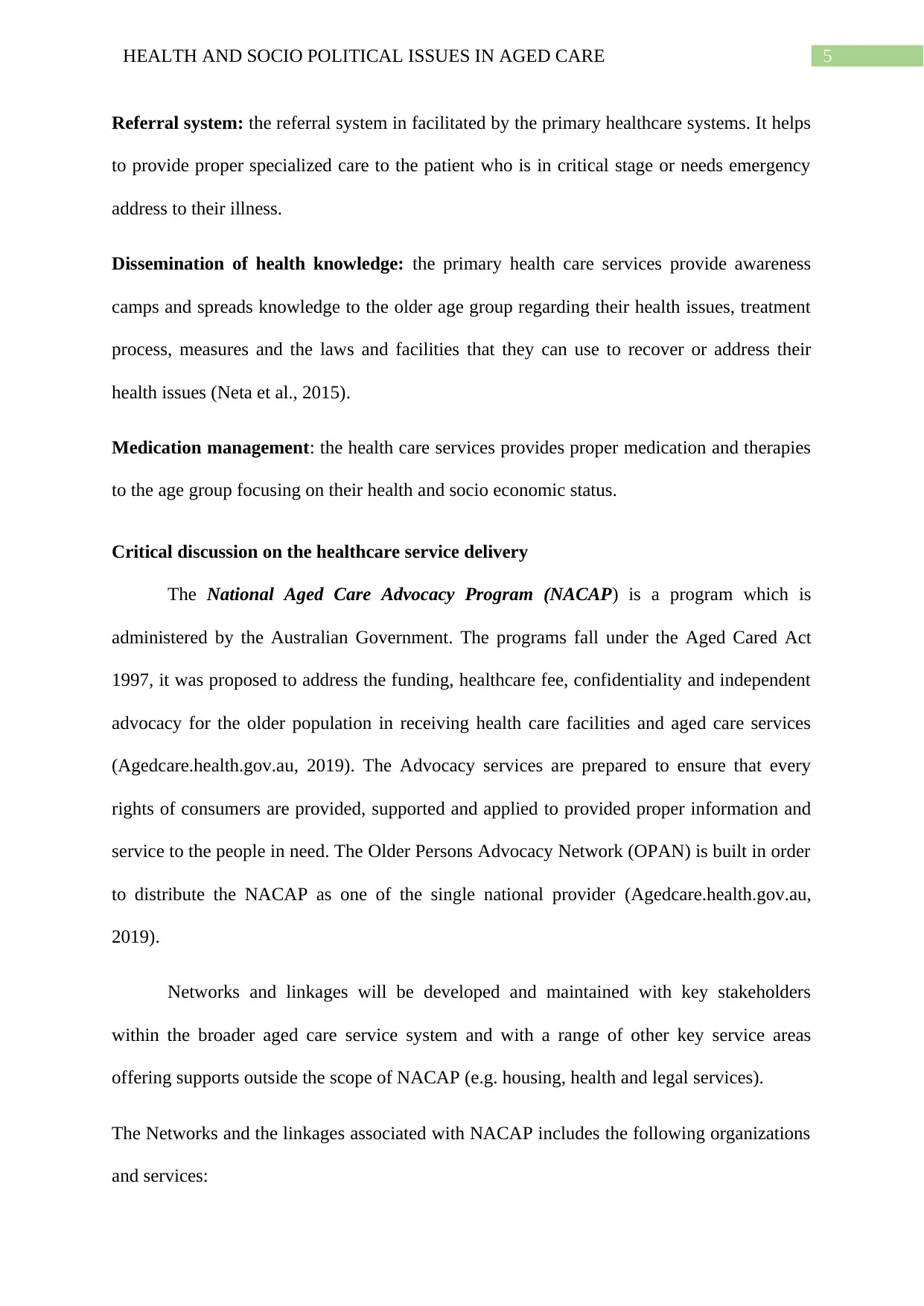
5HEALTH AND SOCIO POLITICAL ISSUES IN AGED CARE
Referral system: the referral system in facilitated by the primary healthcare systems. It helps
to provide proper specialized care to the patient who is in critical stage or needs emergency
address to their illness.
Dissemination of health knowledge: the primary health care services provide awareness
camps and spreads knowledge to the older age group regarding their health issues, treatment
process, measures and the laws and facilities that they can use to recover or address their
health issues (Neta et al., 2015).
Medication management: the health care services provides proper medication and therapies
to the age group focusing on their health and socio economic status.
Critical discussion on the healthcare service delivery
The National Aged Care Advocacy Program (NACAP) is a program which is
administered by the Australian Government. The programs fall under the Aged Cared Act
1997, it was proposed to address the funding, healthcare fee, confidentiality and independent
advocacy for the older population in receiving health care facilities and aged care services
(Agedcare.health.gov.au, 2019). The Advocacy services are prepared to ensure that every
rights of consumers are provided, supported and applied to provided proper information and
service to the people in need. The Older Persons Advocacy Network (OPAN) is built in order
to distribute the NACAP as one of the single national provider (Agedcare.health.gov.au,
2019).
Networks and linkages will be developed and maintained with key stakeholders
within the broader aged care service system and with a range of other key service areas
offering supports outside the scope of NACAP (e.g. housing, health and legal services).
The Networks and the linkages associated with NACAP includes the following organizations
and services:
Referral system: the referral system in facilitated by the primary healthcare systems. It helps
to provide proper specialized care to the patient who is in critical stage or needs emergency
address to their illness.
Dissemination of health knowledge: the primary health care services provide awareness
camps and spreads knowledge to the older age group regarding their health issues, treatment
process, measures and the laws and facilities that they can use to recover or address their
health issues (Neta et al., 2015).
Medication management: the health care services provides proper medication and therapies
to the age group focusing on their health and socio economic status.
Critical discussion on the healthcare service delivery
The National Aged Care Advocacy Program (NACAP) is a program which is
administered by the Australian Government. The programs fall under the Aged Cared Act
1997, it was proposed to address the funding, healthcare fee, confidentiality and independent
advocacy for the older population in receiving health care facilities and aged care services
(Agedcare.health.gov.au, 2019). The Advocacy services are prepared to ensure that every
rights of consumers are provided, supported and applied to provided proper information and
service to the people in need. The Older Persons Advocacy Network (OPAN) is built in order
to distribute the NACAP as one of the single national provider (Agedcare.health.gov.au,
2019).
Networks and linkages will be developed and maintained with key stakeholders
within the broader aged care service system and with a range of other key service areas
offering supports outside the scope of NACAP (e.g. housing, health and legal services).
The Networks and the linkages associated with NACAP includes the following organizations
and services:
⊘ This is a preview!⊘
Do you want full access?
Subscribe today to unlock all pages.

Trusted by 1+ million students worldwide
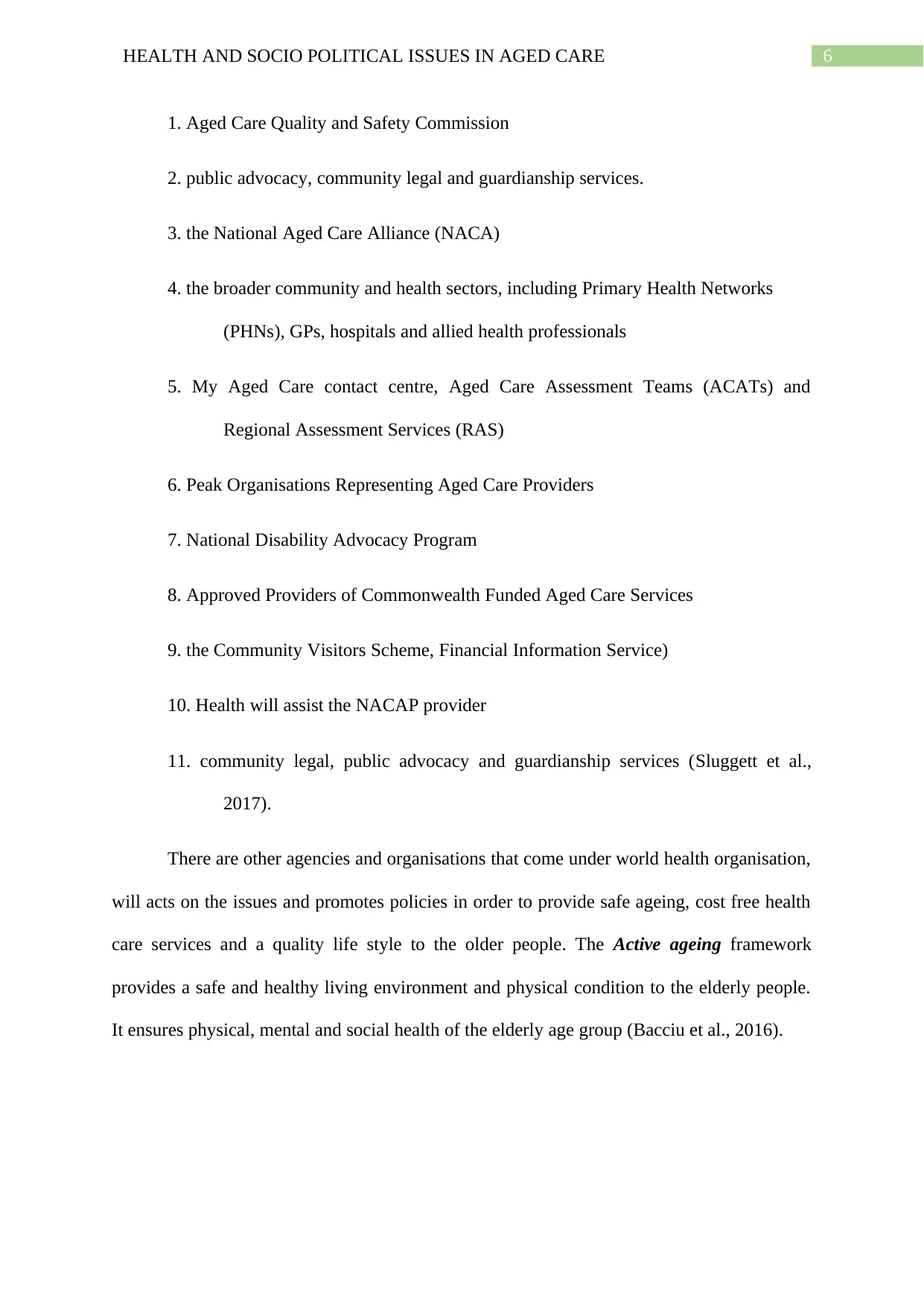
6HEALTH AND SOCIO POLITICAL ISSUES IN AGED CARE
1. Aged Care Quality and Safety Commission
2. public advocacy, community legal and guardianship services.
3. the National Aged Care Alliance (NACA)
4. the broader community and health sectors, including Primary Health Networks
(PHNs), GPs, hospitals and allied health professionals
5. My Aged Care contact centre, Aged Care Assessment Teams (ACATs) and
Regional Assessment Services (RAS)
6. Peak Organisations Representing Aged Care Providers
7. National Disability Advocacy Program
8. Approved Providers of Commonwealth Funded Aged Care Services
9. the Community Visitors Scheme, Financial Information Service)
10. Health will assist the NACAP provider
11. community legal, public advocacy and guardianship services (Sluggett et al.,
2017).
There are other agencies and organisations that come under world health organisation,
will acts on the issues and promotes policies in order to provide safe ageing, cost free health
care services and a quality life style to the older people. The Active ageing framework
provides a safe and healthy living environment and physical condition to the elderly people.
It ensures physical, mental and social health of the elderly age group (Bacciu et al., 2016).
1. Aged Care Quality and Safety Commission
2. public advocacy, community legal and guardianship services.
3. the National Aged Care Alliance (NACA)
4. the broader community and health sectors, including Primary Health Networks
(PHNs), GPs, hospitals and allied health professionals
5. My Aged Care contact centre, Aged Care Assessment Teams (ACATs) and
Regional Assessment Services (RAS)
6. Peak Organisations Representing Aged Care Providers
7. National Disability Advocacy Program
8. Approved Providers of Commonwealth Funded Aged Care Services
9. the Community Visitors Scheme, Financial Information Service)
10. Health will assist the NACAP provider
11. community legal, public advocacy and guardianship services (Sluggett et al.,
2017).
There are other agencies and organisations that come under world health organisation,
will acts on the issues and promotes policies in order to provide safe ageing, cost free health
care services and a quality life style to the older people. The Active ageing framework
provides a safe and healthy living environment and physical condition to the elderly people.
It ensures physical, mental and social health of the elderly age group (Bacciu et al., 2016).
Paraphrase This Document
Need a fresh take? Get an instant paraphrase of this document with our AI Paraphraser
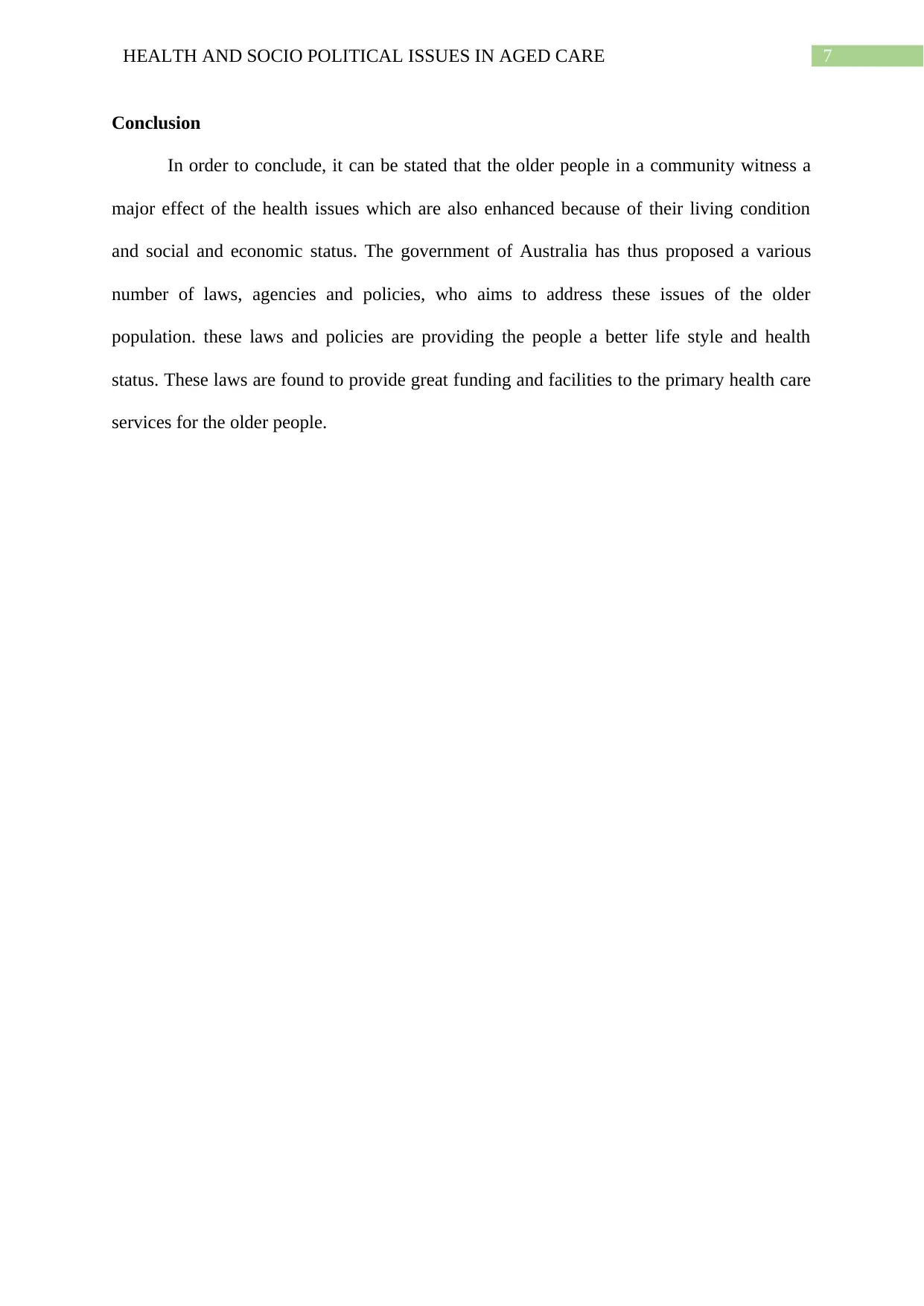
7HEALTH AND SOCIO POLITICAL ISSUES IN AGED CARE
Conclusion
In order to conclude, it can be stated that the older people in a community witness a
major effect of the health issues which are also enhanced because of their living condition
and social and economic status. The government of Australia has thus proposed a various
number of laws, agencies and policies, who aims to address these issues of the older
population. these laws and policies are providing the people a better life style and health
status. These laws are found to provide great funding and facilities to the primary health care
services for the older people.
Conclusion
In order to conclude, it can be stated that the older people in a community witness a
major effect of the health issues which are also enhanced because of their living condition
and social and economic status. The government of Australia has thus proposed a various
number of laws, agencies and policies, who aims to address these issues of the older
population. these laws and policies are providing the people a better life style and health
status. These laws are found to provide great funding and facilities to the primary health care
services for the older people.
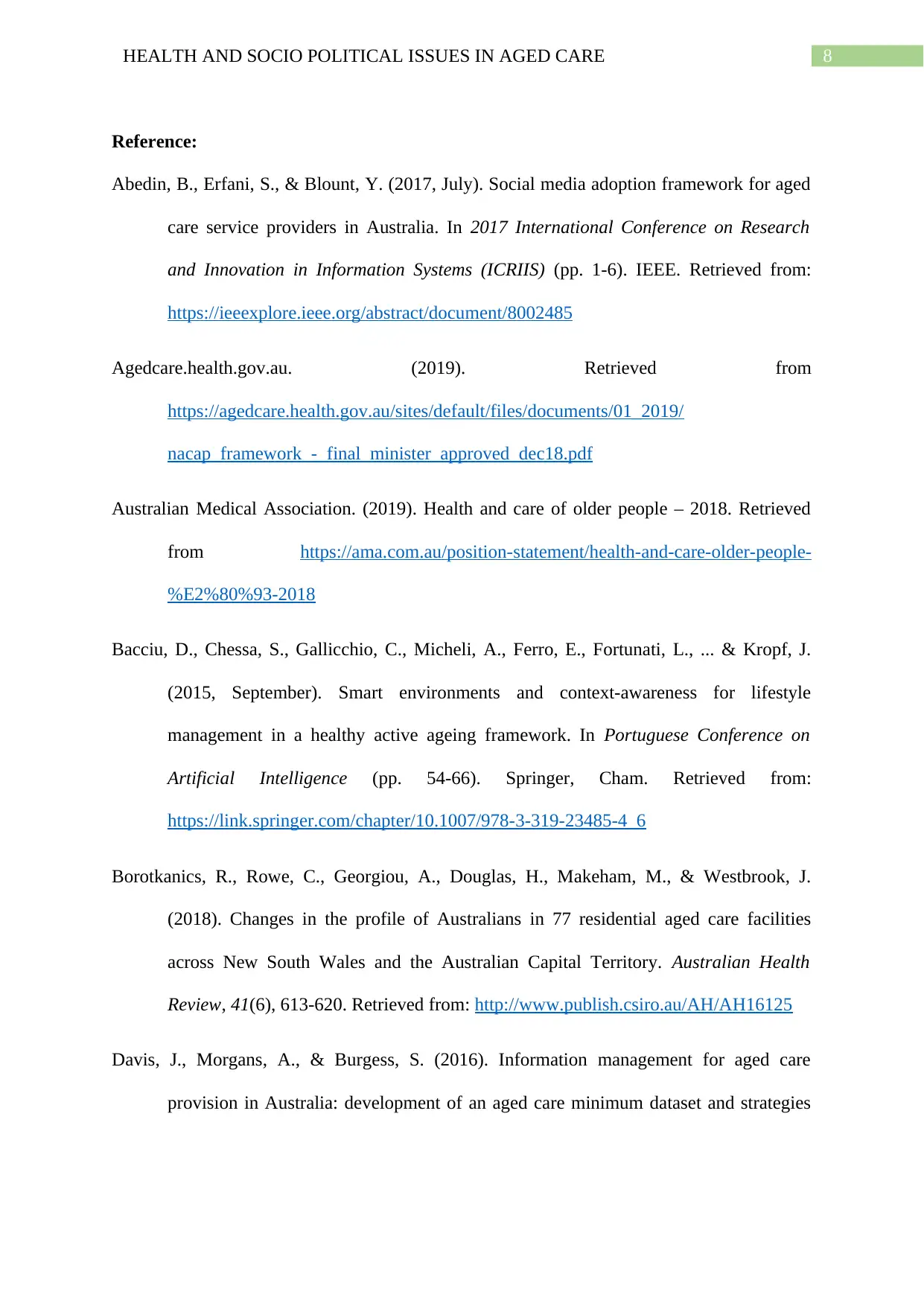
8HEALTH AND SOCIO POLITICAL ISSUES IN AGED CARE
Reference:
Abedin, B., Erfani, S., & Blount, Y. (2017, July). Social media adoption framework for aged
care service providers in Australia. In 2017 International Conference on Research
and Innovation in Information Systems (ICRIIS) (pp. 1-6). IEEE. Retrieved from:
https://ieeexplore.ieee.org/abstract/document/8002485
Agedcare.health.gov.au. (2019). Retrieved from
https://agedcare.health.gov.au/sites/default/files/documents/01_2019/
nacap_framework_-_final_minister_approved_dec18.pdf
Australian Medical Association. (2019). Health and care of older people – 2018. Retrieved
from https://ama.com.au/position-statement/health-and-care-older-people-
%E2%80%93-2018
Bacciu, D., Chessa, S., Gallicchio, C., Micheli, A., Ferro, E., Fortunati, L., ... & Kropf, J.
(2015, September). Smart environments and context-awareness for lifestyle
management in a healthy active ageing framework. In Portuguese Conference on
Artificial Intelligence (pp. 54-66). Springer, Cham. Retrieved from:
https://link.springer.com/chapter/10.1007/978-3-319-23485-4_6
Borotkanics, R., Rowe, C., Georgiou, A., Douglas, H., Makeham, M., & Westbrook, J.
(2018). Changes in the profile of Australians in 77 residential aged care facilities
across New South Wales and the Australian Capital Territory. Australian Health
Review, 41(6), 613-620. Retrieved from: http://www.publish.csiro.au/AH/AH16125
Davis, J., Morgans, A., & Burgess, S. (2016). Information management for aged care
provision in Australia: development of an aged care minimum dataset and strategies
Reference:
Abedin, B., Erfani, S., & Blount, Y. (2017, July). Social media adoption framework for aged
care service providers in Australia. In 2017 International Conference on Research
and Innovation in Information Systems (ICRIIS) (pp. 1-6). IEEE. Retrieved from:
https://ieeexplore.ieee.org/abstract/document/8002485
Agedcare.health.gov.au. (2019). Retrieved from
https://agedcare.health.gov.au/sites/default/files/documents/01_2019/
nacap_framework_-_final_minister_approved_dec18.pdf
Australian Medical Association. (2019). Health and care of older people – 2018. Retrieved
from https://ama.com.au/position-statement/health-and-care-older-people-
%E2%80%93-2018
Bacciu, D., Chessa, S., Gallicchio, C., Micheli, A., Ferro, E., Fortunati, L., ... & Kropf, J.
(2015, September). Smart environments and context-awareness for lifestyle
management in a healthy active ageing framework. In Portuguese Conference on
Artificial Intelligence (pp. 54-66). Springer, Cham. Retrieved from:
https://link.springer.com/chapter/10.1007/978-3-319-23485-4_6
Borotkanics, R., Rowe, C., Georgiou, A., Douglas, H., Makeham, M., & Westbrook, J.
(2018). Changes in the profile of Australians in 77 residential aged care facilities
across New South Wales and the Australian Capital Territory. Australian Health
Review, 41(6), 613-620. Retrieved from: http://www.publish.csiro.au/AH/AH16125
Davis, J., Morgans, A., & Burgess, S. (2016). Information management for aged care
provision in Australia: development of an aged care minimum dataset and strategies
⊘ This is a preview!⊘
Do you want full access?
Subscribe today to unlock all pages.

Trusted by 1+ million students worldwide
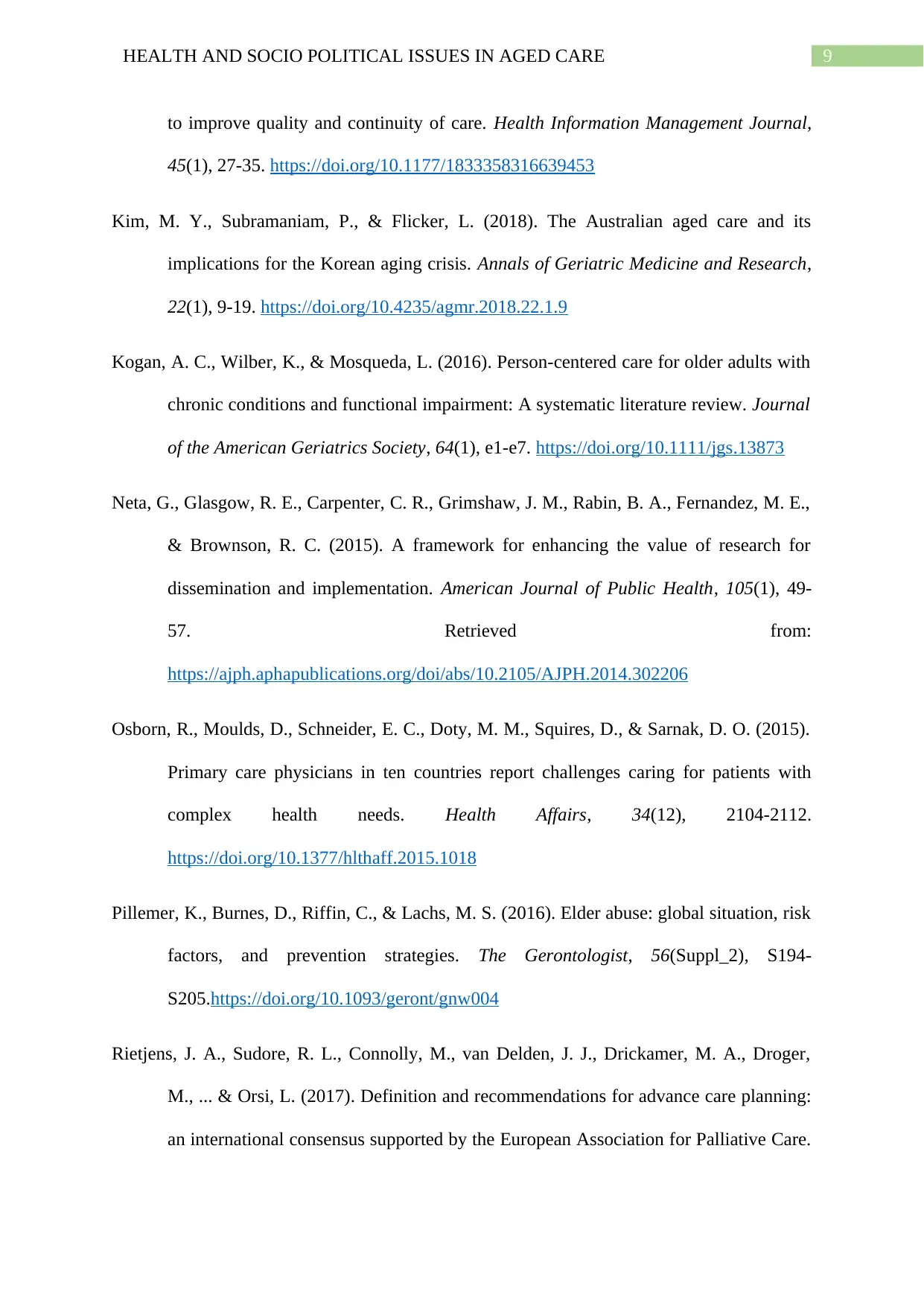
9HEALTH AND SOCIO POLITICAL ISSUES IN AGED CARE
to improve quality and continuity of care. Health Information Management Journal,
45(1), 27-35. https://doi.org/10.1177/1833358316639453
Kim, M. Y., Subramaniam, P., & Flicker, L. (2018). The Australian aged care and its
implications for the Korean aging crisis. Annals of Geriatric Medicine and Research,
22(1), 9-19. https://doi.org/10.4235/agmr.2018.22.1.9
Kogan, A. C., Wilber, K., & Mosqueda, L. (2016). Person‐centered care for older adults with
chronic conditions and functional impairment: A systematic literature review. Journal
of the American Geriatrics Society, 64(1), e1-e7. https://doi.org/10.1111/jgs.13873
Neta, G., Glasgow, R. E., Carpenter, C. R., Grimshaw, J. M., Rabin, B. A., Fernandez, M. E.,
& Brownson, R. C. (2015). A framework for enhancing the value of research for
dissemination and implementation. American Journal of Public Health, 105(1), 49-
57. Retrieved from:
https://ajph.aphapublications.org/doi/abs/10.2105/AJPH.2014.302206
Osborn, R., Moulds, D., Schneider, E. C., Doty, M. M., Squires, D., & Sarnak, D. O. (2015).
Primary care physicians in ten countries report challenges caring for patients with
complex health needs. Health Affairs, 34(12), 2104-2112.
https://doi.org/10.1377/hlthaff.2015.1018
Pillemer, K., Burnes, D., Riffin, C., & Lachs, M. S. (2016). Elder abuse: global situation, risk
factors, and prevention strategies. The Gerontologist, 56(Suppl_2), S194-
S205.https://doi.org/10.1093/geront/gnw004
Rietjens, J. A., Sudore, R. L., Connolly, M., van Delden, J. J., Drickamer, M. A., Droger,
M., ... & Orsi, L. (2017). Definition and recommendations for advance care planning:
an international consensus supported by the European Association for Palliative Care.
to improve quality and continuity of care. Health Information Management Journal,
45(1), 27-35. https://doi.org/10.1177/1833358316639453
Kim, M. Y., Subramaniam, P., & Flicker, L. (2018). The Australian aged care and its
implications for the Korean aging crisis. Annals of Geriatric Medicine and Research,
22(1), 9-19. https://doi.org/10.4235/agmr.2018.22.1.9
Kogan, A. C., Wilber, K., & Mosqueda, L. (2016). Person‐centered care for older adults with
chronic conditions and functional impairment: A systematic literature review. Journal
of the American Geriatrics Society, 64(1), e1-e7. https://doi.org/10.1111/jgs.13873
Neta, G., Glasgow, R. E., Carpenter, C. R., Grimshaw, J. M., Rabin, B. A., Fernandez, M. E.,
& Brownson, R. C. (2015). A framework for enhancing the value of research for
dissemination and implementation. American Journal of Public Health, 105(1), 49-
57. Retrieved from:
https://ajph.aphapublications.org/doi/abs/10.2105/AJPH.2014.302206
Osborn, R., Moulds, D., Schneider, E. C., Doty, M. M., Squires, D., & Sarnak, D. O. (2015).
Primary care physicians in ten countries report challenges caring for patients with
complex health needs. Health Affairs, 34(12), 2104-2112.
https://doi.org/10.1377/hlthaff.2015.1018
Pillemer, K., Burnes, D., Riffin, C., & Lachs, M. S. (2016). Elder abuse: global situation, risk
factors, and prevention strategies. The Gerontologist, 56(Suppl_2), S194-
S205.https://doi.org/10.1093/geront/gnw004
Rietjens, J. A., Sudore, R. L., Connolly, M., van Delden, J. J., Drickamer, M. A., Droger,
M., ... & Orsi, L. (2017). Definition and recommendations for advance care planning:
an international consensus supported by the European Association for Palliative Care.
Paraphrase This Document
Need a fresh take? Get an instant paraphrase of this document with our AI Paraphraser
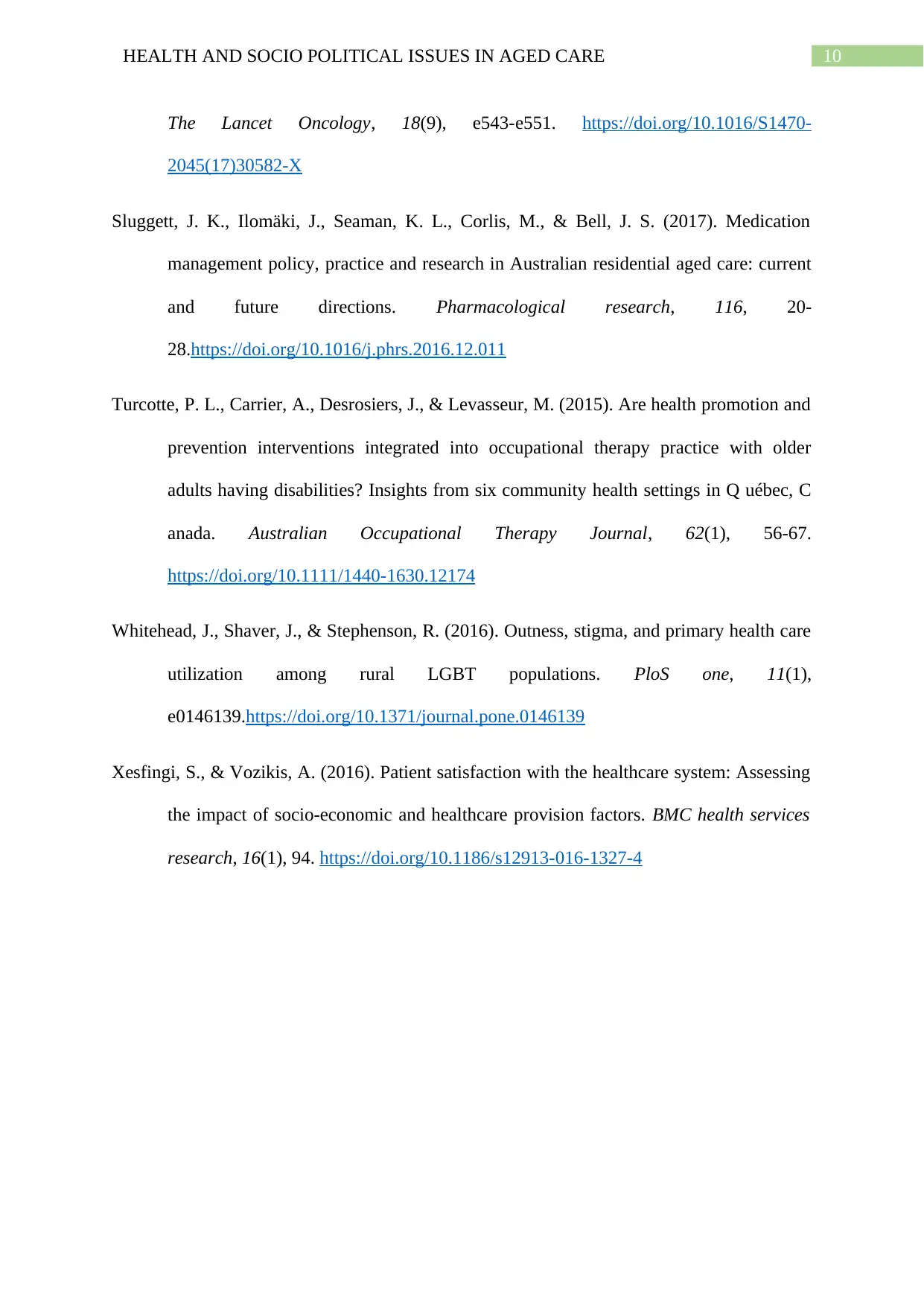
10HEALTH AND SOCIO POLITICAL ISSUES IN AGED CARE
The Lancet Oncology, 18(9), e543-e551. https://doi.org/10.1016/S1470-
2045(17)30582-X
Sluggett, J. K., Ilomäki, J., Seaman, K. L., Corlis, M., & Bell, J. S. (2017). Medication
management policy, practice and research in Australian residential aged care: current
and future directions. Pharmacological research, 116, 20-
28.https://doi.org/10.1016/j.phrs.2016.12.011
Turcotte, P. L., Carrier, A., Desrosiers, J., & Levasseur, M. (2015). Are health promotion and
prevention interventions integrated into occupational therapy practice with older
adults having disabilities? Insights from six community health settings in Q uébec, C
anada. Australian Occupational Therapy Journal, 62(1), 56-67.
https://doi.org/10.1111/1440-1630.12174
Whitehead, J., Shaver, J., & Stephenson, R. (2016). Outness, stigma, and primary health care
utilization among rural LGBT populations. PloS one, 11(1),
e0146139.https://doi.org/10.1371/journal.pone.0146139
Xesfingi, S., & Vozikis, A. (2016). Patient satisfaction with the healthcare system: Assessing
the impact of socio-economic and healthcare provision factors. BMC health services
research, 16(1), 94. https://doi.org/10.1186/s12913-016-1327-4
The Lancet Oncology, 18(9), e543-e551. https://doi.org/10.1016/S1470-
2045(17)30582-X
Sluggett, J. K., Ilomäki, J., Seaman, K. L., Corlis, M., & Bell, J. S. (2017). Medication
management policy, practice and research in Australian residential aged care: current
and future directions. Pharmacological research, 116, 20-
28.https://doi.org/10.1016/j.phrs.2016.12.011
Turcotte, P. L., Carrier, A., Desrosiers, J., & Levasseur, M. (2015). Are health promotion and
prevention interventions integrated into occupational therapy practice with older
adults having disabilities? Insights from six community health settings in Q uébec, C
anada. Australian Occupational Therapy Journal, 62(1), 56-67.
https://doi.org/10.1111/1440-1630.12174
Whitehead, J., Shaver, J., & Stephenson, R. (2016). Outness, stigma, and primary health care
utilization among rural LGBT populations. PloS one, 11(1),
e0146139.https://doi.org/10.1371/journal.pone.0146139
Xesfingi, S., & Vozikis, A. (2016). Patient satisfaction with the healthcare system: Assessing
the impact of socio-economic and healthcare provision factors. BMC health services
research, 16(1), 94. https://doi.org/10.1186/s12913-016-1327-4
1 out of 11
Related Documents
Your All-in-One AI-Powered Toolkit for Academic Success.
+13062052269
info@desklib.com
Available 24*7 on WhatsApp / Email
![[object Object]](/_next/static/media/star-bottom.7253800d.svg)
Unlock your academic potential
Copyright © 2020–2026 A2Z Services. All Rights Reserved. Developed and managed by ZUCOL.





